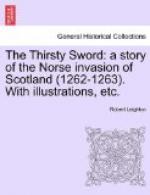The steward of Scotland then drew up his forces to the heights, where they formed anew. There they remained for many hours in the shelter of the woods, for the storming of the elements was terrible to behold.
Towards evening the tempest lulled and the Norsemen, still undaunted, again ventured ashore in vast numbers, landing their boats through a tremendous surf. These new troops, led by Roderic MacAlpin and Haffling of Orkney, attacked the Scots upon two points, making a desperate charge, and with such success that they killed many and drove the whole army back into the farther valley. But here the Scots suddenly halted. Their left wing wheeled round, and taking the invaders in their rear they speedily brought to an end that battle of Largs.
The relics of this brave body of invaders, with their two leaders, again embarked in their boats, and although the storm continued, safely arrived at the fleet. The remaining ships of Hakon were woefully shattered; they drove from their anchors, many were stranded on the shore, others struck against shallows and rocks, or found equal disaster by running foul of each other.
The next morning presented a beach covered with dead bodies and a sea strewn with wreckage.
King Hakon himself had never so much as drawn his sword. His barons and officers had urged him to remain on board his ship. Defeated, and dismayed at his manifold disasters, he called for a truce for the burial of his dead, and five days were spent by friend and foe in consort in raising above the graves of the fallen warriors those rude memorials the traces of which still remain to mark the field of battle.
Of the twenty thousand followers of the Norse king scarcely as many hundreds remained alive, and of his splendid fleet but a score of dismantled galleys were left afloat to carry back the defeated invaders to their several homes.
Crossing to the outer seas, Hakon gathered about him the few pirate chiefs who had joined him in the hope of plunder, and upon them he bestowed as rewards for their service the islands of which he had made imaginary conquest. He gave the isle of Arran to Earl Margad, who had invaded it, and upon Roderic MacAlpin he bestowed the isle of Bute. These chiefs, however, did not at once take possession of their estates, but remained on the ships that they might help to replenish the exhausted provisions of the fleet by forcible contribution from the isles.
King Hakon now felt the vast change that had come over his armament during the few weeks since he sailed down among the Western Isles, conquering and winning to his side the island princes as vassals of his flag. He returned as a baffled invader, and encountered many severe rebuffs from the islanders as well as further disasters from the winter storms. The fatigues of that expedition and his bitter disappointments sank deep into his old heart, and never again did he see the home that he had left. Landing in Orkney on the 29th of October, he remained in the palace of Kirkwall, and there died a broken-hearted man.




